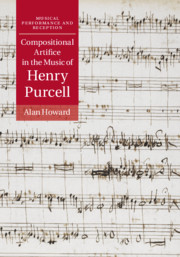Book contents
- Compositional Artifice in the Music of Henry Purcell
- Musical Performance and Reception
- Compositional Artifice in the Music of Henry Purcell
- Copyright page
- Contents
- Figures
- Tables
- Music Examples
- Acknowledgements
- Note on Music Examples
- Abbreviations
- Glossary of Analytical Terms
- Introduction
- Part I Purcell’s ‘Art of Descant’
- Part II ‘Thou dost thy former skill improve’
- Chapter 5 ‘Celestial art[ifice]’ in Hail, bright Cecilia
- Chapter 6 Artifice and Musical Modelling
- Chapter 7 Augmentation as Artifice, Artifice as Augmentation
- Chapter 8 ‘Italian sonatas in orchestral garb’
- Bibliography
- Index of Compositions
- General Index
Chapter 6 - Artifice and Musical Modelling
from Part II - ‘Thou dost thy former skill improve’
Published online by Cambridge University Press: 30 September 2019
- Compositional Artifice in the Music of Henry Purcell
- Musical Performance and Reception
- Compositional Artifice in the Music of Henry Purcell
- Copyright page
- Contents
- Figures
- Tables
- Music Examples
- Acknowledgements
- Note on Music Examples
- Abbreviations
- Glossary of Analytical Terms
- Introduction
- Part I Purcell’s ‘Art of Descant’
- Part II ‘Thou dost thy former skill improve’
- Chapter 5 ‘Celestial art[ifice]’ in Hail, bright Cecilia
- Chapter 6 Artifice and Musical Modelling
- Chapter 7 Augmentation as Artifice, Artifice as Augmentation
- Chapter 8 ‘Italian sonatas in orchestral garb’
- Bibliography
- Index of Compositions
- General Index
Summary
At the climax of his last great choral work, the orchestral Te Deum and Jubilate in D major for the St Cecilia’s Day celebrations of 1694, Purcell dusted off a contrapuntal motif familiar from the end of his much earlier Fantazia XII (Ex. 6.1). Moreover, he also used exactly the same compositional conceit in his working of this motif – no doubt, in fact, his very choice of materials was motivated by the desire to select an idea suitable for subjection to the extreme contrapuntal augmentation of bars 201–8, an illustration of the words ‘world without end’.
- Type
- Chapter
- Information
- Compositional Artifice in the Music of Henry Purcell , pp. 151 - 186Publisher: Cambridge University PressPrint publication year: 2019

